Electric vehicles (EVs) are gaining momentum once again, with Dr. Cosmas Chiteme attributing their resurgence to the high greenhouse gas emissions produced by combustion engines. Speaking at the 2nd E-Mobility Summit in Gqeberha, Chiteme highlighted South Africa’s potential to become a key player in the global EV value chain.
The summit brought together industry experts, leaders, and specialists in alternative energy solutions to showcase the latest innovations in electric vehicles. Leading manufacturers like Volvo, Tesla, and Volkswagen showcased their high-value EVs, signaling a shift towards a more sustainable mode of transportation.
Chiteme noted that while the first EVs were introduced in the early 90s, they were overshadowed by traditional combustion engines. However, with the growing concern over greenhouse gas emissions, electric vehicles are now making a comeback. Chiteme predicted that global electric car sales could reach 17 million in 2024, accounting for more than one in five cars sold worldwide.
Acknowledging the Ministry of Trade, Industry and Competition’s White Paper on Electric Vehicles, Chiteme emphasized the need for the automotive industry to transition towards producing more electric vehicles by 2035. He highlighted the abundance of essential minerals in South Africa and neighboring countries, such as manganese, platinum group metals, cobalt, lithium, nickel, and graphite, that are crucial components of EV batteries.
South Africa’s role as a major producer of manganese positions the country as a key supplier for the growing EV market. Chiteme stressed the importance of local beneficiation and processing of these minerals to capture more value in the EV supply chain.
The Department of Science, Technology, and Innovation envisions a full value chain for electric vehicles in South Africa, starting from processing mineral ores to manufacturing batteries and eventually assembling and producing EVs locally. Government investment in training programs to develop the necessary skills for the e-mobility sector is crucial for the industry’s growth.
President Cyril Ramaphosa reiterated the government’s commitment to supporting the EV sector at the recent SA Auto Week. He emphasized the need for the local automotive sector to capitalize on the demand for electric vehicles, new energy vehicles, and sustainable fuels.
In conclusion, the shift towards electric vehicles presents a significant opportunity for South Africa to position itself as a key player in the global EV value chain. With abundant mineral resources and government support, the country has the potential to drive sustainable transport solutions and contribute to a greener future.








